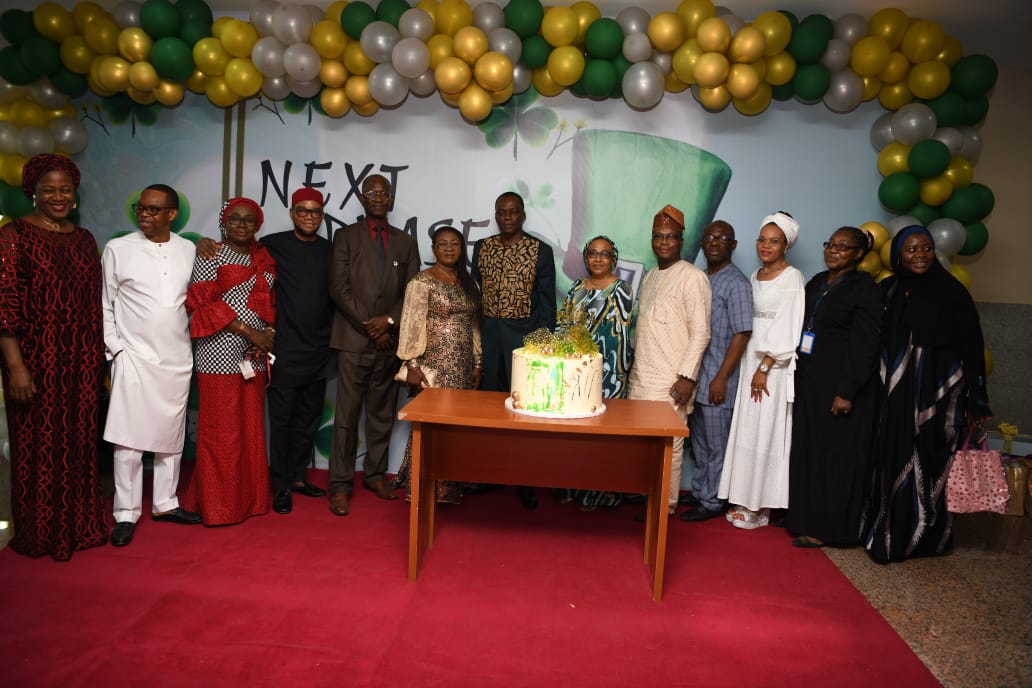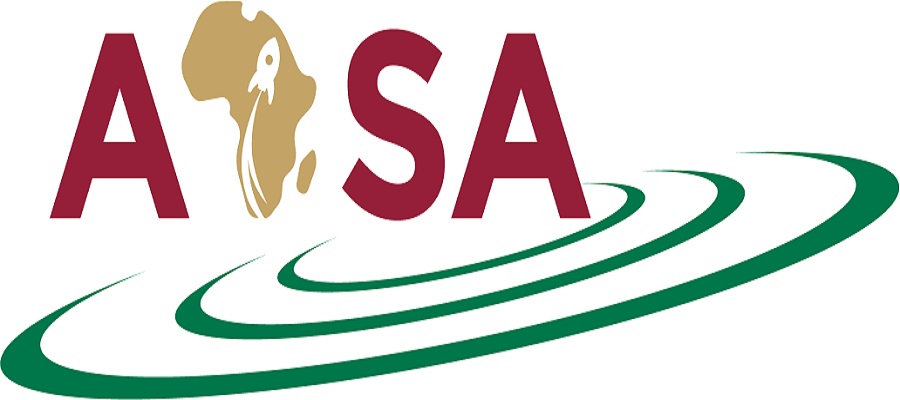Telecom
Encomiums as Okodu Bows out of NCC

Durojaiye Anthony Okodu is an unusually calm, friendly, stylish and very considerate staff of the Nigerian Communications Commission (NCC). A man without negative airs, yet he carries himself with the avuncular grace.

His physical persona is marked by an exceptional gait that matches his physique. A man of naturally tall framing devoid of excessive fat that makes him able to move swiftly and magisterially. Importantly, Okodu’s humility and affable disposition easily endear him to everyone.
So, expectedly, last Friday, April 8, 2022, staff of NCC gathered at the imposing auditorium of the Commission’s Head Office Annex at Mbora District, Abuja, to honour Okodu, also known as “Baba Naira”, as he bowed out of NCC having reached the mandatory retirement age of 60 years and after 28 years of meritorious service.
Okudu began his career at the Commission in July 1994, as a cashier on transfer from the erstwhile Ministry of Communications, where he was headhunted by a former director of the Commission, Felicia Onwuegbuchulam. From then on, he had risen through the ranks, before eventually retiring as a Principal Manager, Projects, at NCC.
At the well-attended valedictory session, staff, friends, and well-wishers of Okudu, paid glowing tributes in torrents to the man who can aptly be described as man of the people. Many were nostalgic and poignant while others were joyous, optimistic and tellingly introspective that Okodu would thrive in the next phase of his life.
In her remark, the NCC’s Director, Projects, Iyabode Solanke, who is Okodu’s last supervisor before his retirement, and who was Okodu’s head of Department while they both worked at the Commission’s Department of Financial Services, extolled the retiree for his dedication, as well as his dressing code and excellent work ethics, which she said are worthy of emulation. Sholanke was represented by a Deputy Director in the department, Philip Eretan, who also attended the valedictory session in his own capacity as a friend of Okodu.
In the same vein, NCC’s Director, Zonal Operations, Amina Shehu, in her goodwill message, stated that in every interaction she had with Okodu, she had observed his stellar qualities, such as empathy, kindness, and gentleness. She added that he was also consistent in everything he did.
For Dr. Ikechukwu Adinde, NCC’s Director, Public Affairs, who also attended the valedictory party, anyone would be easily impressed by Okodu’s level of dedication to duty, which has become a mark of Okodu’s outings and career at the Commission. Adinde said that Okodu was not merely ever-present whenever he was needed most, he also, every so often, displays emotional intelligence, and never lost his temper no matter the level of provocation. “I am also impressed by Okodu’s social networking skills which had enabled him to remain connected with every staff,” Adinde emphasised.
The Director, Compliance Monitoring and Enforcement, at the Commission, Ephraim Nwokonneya, profoundly recalled the attributes exhibited by Okodu that are so quite distinctive when he had the opportunity of working with Okodu in the Financial Services Department of the Commission.
Nwokonneya said when he was assigned to the Department of Financial Services of the Commission as a Principal Manager, he had worked closely with Okodu, who characteristically was full of zeal and energy. He said Okodu was very efficient and easily endeared himself to everyone. Nwokonneya encouraged him to look at retirement as a time of rejuvenation, reflection and prosperity.
A longtime companion and friend of Okodu, who was so evidently elated at Okodu’s befitting retirement, Olatokunbo Oyeleye, a Deputy Director at the New Media and Information Security Department of the Commission, said Okodu made her beginnings at the Commission a wonderful experience.
“To Oyeleye, Okodu is more than a colleague, “he is a brother,” she said and proceeded to recall with gratitude when she joined the Commission as a fresh graduate, “Okodu and his wife accommodated me, taking me under their wings”.
This humane side of Okudu was underscored by Hafsat Lawal, Head, Consumer Policy Development and Monitoring, who asserted that Okudu was a mentor and a friend in need.
“He is reliable and dependable, exuding high level of understanding in all matters and he would go out of his way to ensure everyone was comfortable,” Lawal said.
Former staff of the Commission were also not left out of the celebration. Among them, who attended and poured encomiums on Okodu, are Felicia Onwuegbuchulam, who retired from NCC as Director Consumer Affairs two years ago, and Abubakar Yakubu, a former Director at the Commission who voluntarily retired in 2019.
Onwuegbuchulam, a noted friend and confidant of Okodu who influenced Okodu to join the Commission 28 years ago, said she had no regrets in recommending Okudu to the Management of the Commission at the time.
She said she was gratified that Okodu did not only had a chequered career at the Commission, he also excelled remarkably.
Yakubu, in a goodwill message he sent to the valedictory programme which was read on his behalf, praised Okodu for his dedication to the Commission.
He declared that Okodu was one of the few staff who would work long hours, and would even work at home. He added that Okodu’s commitment and relentlessness to delivering on his assigned duties were total and spectacular.
Okudu, who spoke at the end of the speeches, thanked the audience and all those who had honoured him with their presence and kind words. Reflecting on the occasion with philosophical calmness and thanksgiving to God, Okodu said there had to be an end to every beginning but he thanked God for the privilege to witness his retirement day alive. While expressing delight over all the goodwill messages received, he enjoined the younger staff who would be taking over the baton, to be hardworking. He also advised that Commission can only thrive if staff remain hardworking in a consistent manner, and are dedicated and loyal to the Commission.
Other contributors at the event included Ajoke Atte, Head, Procurement; Solomon Igbayue, Assistant Director, Policy Competition and Economic Analysis; Emeka Nnama, Senior Manager, Zonal Operations; and Anthony Bassey, Senior Manager, Administration, all staff of the Commission who extolled Okodu’s distinctive virtues and dedication to the aspirations of the Commission. They all wished Okodu a life of grace and bliss in retirement.
Telecom
MTN Nigeria Drags 20 Banks to Court over N6Bn Debt by SleekChip

MTN Nigeria has taken legal action against more than 20 banks as it intensifies efforts to recover nearly ₦6 billion in interconnect debt from SleekChip Technologies Limited, a licensed international direct access and transit service provider.

Karl Toriola, chief executive officer, MTN Nigeria
This move comes on the back of a court judgment awarding the telecom giant the right to reclaim funds owed through garnishee proceedings.
The Federal High Court in Abuja, presided over by Justice Peter Lifu, ruled in November 2024 that SleekChip must pay MTN $1.97 million—or its naira equivalent at the Central Bank of Nigeria’s official rate at the time.
The court also granted interest on the debt at a rate 2% above the Nigerian Interbank Offer Rate, backdated to January 31, 2022, until full repayment is made.
At the heart of the dispute lies a 2019 interconnection agreement between MTN and SleekChip, which permitted the exchange of calls and messages between their networks.
MTN alleged that from January to October 2022, SleekChip accumulated significant unpaid charges.
Despite repeated demand notices and a formal acknowledgment of debt by SleekChip in May 2023, no repayment was made.
With the judgment in hand, MTN has proceeded to enforce it by seeking court orders to freeze and seize SleekChip’s funds held across Nigerian banks.
The telecom operator pegged the naira value of the judgment debt at over ₦3.28 billion based on the exchange rate of ₦1,665.84 to the dollar as of November 7, 2024, with interest claims pushing the amount beyond ₦5 billion.
Court records show that on May 16, 2025, representatives from MTN and several banks appeared before Justice Lifu.
MTN submitted that most banks had filed affidavits disclosing the status of any accounts held by SleekChip.
The court subsequently discharged over 10 banks that confirmed they had no financial ties to the debtor.
Some banks raised objections to MTN’s request to extend searches using the debtor’s BVN, arguing that the court had issued no such order. The court has scheduled the next hearing for June 26, 2025, to continue the garnishee proceedings.
This case adds to a growing list of MTN’s debt recovery efforts across Nigeria’s telecom sector. In 2023, the Nigerian Communications Commission (NCC) approved MTN’s request to disconnect several service providers over similar unpaid interconnect charges—including SleekChip and Exchange Telecommunications.
The ongoing legal enforcement signals MTN’s strategic shift toward reclaiming debts through court-backed recovery rather than relying solely on regulatory pressure.
With mounting operational costs and network expansion demands, telecom operators are becoming less tolerant of defaults, especially in interconnect fee obligations.
Telecom
Africa Launches First Continental Space Agency

Africa has launched its first continental space agency to enhance Earth observation and data sharing at a time when a more challenging global environment is restricting access to climate and weather information.

The African Space Agency was inaugurated last month under the African Union’s umbrella and is based in Cairo.
Currently in the process of establishment and recruiting key personnel, the agency will oversee coordination of existing national space programs.
Its goal is to strengthen the continent’s space infrastructure by deploying satellites, installing weather stations, and ensuring data sharing across Africa and beyond.
“Space activities across the continent have been very fragmented,” explained Meshack Kinyua, a space engineer and experienced African space policy expert who now leads capacity-building at the agency.
“The African Space Agency introduces a coordination framework and economies of scale — it places all African Union members on an equal footing regarding access to gathered data based on their needs.”
Africa is the poorest continent globally, and its people are among the most vulnerable to extreme weather events worsened by climate change, despite contributing far less to global warming than those in developed nations.
The absence of high-resolution weather and climate data hinders governments from warning citizens about approaching extreme weather, and scientists cannot accurately forecast long-term trends because their models lack detailed data.
The African Space Agency represents a move toward changing this, Kinyua said.
The agency also seeks to expand some successful projects across the continent, such as early warning systems for fishermen in West Africa and the Congo River Basin, he added.
Though long planned, the agency’s launch comes shortly after the Trump administration dismantled the US Agency for International Development (USAID), which had been a major funder of various programs in Africa.
When 80% of USAID’s projects were canceled, initiatives like SERVIR—a joint effort by USAID, NASA, and space organizations in developing countries to address climate change, food security, and natural disasters—were among those affected.
“We need to ensure that African satellites can improve measurements and fill data gaps,” Kinyua stated.
“These gaps will always exist, so we must fill some ourselves and collaborate with other agencies.”
The African agency has already partnered with the European Space Agency to train experts and exchange knowledge, including in data processing and satellite construction.
In Europe, national space agencies share the costs of launching new Earth observation satellites, which can reach up to €800 million ($897 million), said Benjamin Koetz, head of the long-term action section at the European Space Agency. Countries also share the data gathered by these satellites.
“Not every country needs to invest in and build the same satellite,” Koetz explained.
Cairo launched Africa’s first satellite in 1998, and since then, over 20 African nations have established their own space agencies.
Eighteen of these countries have launched a combined total of 63 satellites.
The African Union plans to fund the African Space Agency on a project-by-project basis.
“Securing financial resources is a challenge because there is so much to accomplish, and our resources are limited,” Kinyua explained.
“However, we must take small steps before we can start running.”
Africa’s early space leaders — including Nigeria, Egypt, and South Africa — took a considerable amount of time to establish their agencies and become operational because they had to begin from the ground up, noted Danielle Wood, an associate professor and director of the Space Enabled Research Group at the Massachusetts Institute of Technology.
“It shouldn’t take that long anymore since many African countries now have space experience, and ideally, new countries can learn from existing examples and collaborate to move faster,” she added. “While other players like the US and Europe will pursue their own interests, the African Space Agency will remain focused on Africa, so it should support every country on the continent.”
Telecom
Minister Decries High Rate of Nigerian Women Access Gap to Smartphones

Bosun Tijani, Minister of Communications, Innovation and Digital Economy, has revealed that at least 68% of Nigerian women lack access to smartphones, a barrier that limits their participation in the digital economy and access to essential online services.

Tijani revealed this during a press briefing in Abuja to mark the 2025 World Telecommunication and Information Society Day (WTISD), observed every year on May 17th.
Represented by Adeyemo Olugbenga, Director of the National Frequency Management Council Secretariat, Tijani emphasised that as Nigeria fast-tracks its digital transformation, it remains committed to inclusivity, ensuring that no one, particularly women and girls, is left behind.
The Minister reaffirmed the government’s commitment to equipping 70% of Nigerian women and girls with advanced digital skills by 2027.
He also revealed that the government is collaborating with the African Development Bank (AfDB), the World Bank, and private investors to offer grants and low-interest loans to women-led tech startups, supporting inclusive growth in the digital sector.
Represented by Adeyemo Olugbenga, Director of the National Frequency Management Council Secretariat, Tijani emphasised that the digital revolution can only be truly transformative if it is inclusive.
He stressed the importance of building a future where gender equality is not just an aspiration but a lived reality.
While acknowledging Nigeria’s progress in achieving 46.2% broadband penetration, he noted that the digital economy goes beyond infrastructure and innovation; it is ultimately about people.
He warned that when half the population continues to face barriers to access, skills, and leadership in technology, the nation is not only failing its women but also undermining its overall potential.
The Minister emphasized that achieving gender equality in the digital age cannot rest solely on the shoulders of government.
He urged the private sector to play a pivotal role by adopting gender-responsive hiring practices, investing in women-led tech hubs, and implementing workplace policies that empower women.
Highlighting the government’s commitment to inclusive digital growth, he noted that the ministry has launched several key programmes and initiatives aimed at fostering broad-based participation in the digital economy.
Among these is the National Gender Digital Inclusion Strategy (NGDIS) 2004–2077, designed to create safe online spaces for women and support their advancement in technology-driven sectors.
In terms of skills development, the minister pointed to the expansion of impactful programmes such as the 3 Million Technical Talents (MTT) initiative, the Nigeria Artificial Intelligence Research Scheme, Digital Nigeria, and efforts to strengthen local content and capacity.
Recognising the growing need for online safety, he added that the ministry is actively enhancing cybersecurity and anti-harassment frameworks to better protect women in digital spaces.
He also stressed the importance of challenging gender stereotypes by encouraging young girls to pursue Science, Technology, Engineering, and Mathematics (STEM) education from an early age.
Tijanii called on civil society organisations and the media to amplify the achievements of women in tech and hold decision-makers accountable for inclusive policy implementation.
Speaking on the theme of this year’s World Telecommunication and Information Society Day, “Gender Equality in Digital Transformation,” the minister described it as both timely and essential.
He warned that when women and girls are excluded from accessing technology, acquiring digital skills, or leading in tech sectors, it is not just their potential that is stifled—but the world’s.
The minister reaffirmed the significance of WTISD, which serves as a platform to raise global awareness about the transformative power of ICTs.
He noted that digital innovation, such as leveraging artificial intelligence to combat climate change and eradicate poverty, holds immense promise in addressing some of the world’s most urgent challenges.

 E-Financial2 days ago
E-Financial2 days agoAccess Holdings Sets Benchmark in Fraud Prevention With ₦193.5Bn Tech Investment

 E-Financial2 days ago
E-Financial2 days agoMTN’s Digital Lending Arm Disburses $592m Loans in Q1

 E-Financial2 days ago
E-Financial2 days agoAccess Bank, Deloitte Partner to Equip SMEs with Tools for Growth

 News2 days ago
News2 days agoSERAP Asks Ojulari, NNPC CEO to Account for Missing N500Bn or Face Legal Action

 E-Financial2 days ago
E-Financial2 days agoFG Verifies 2m Households for Cash Transfer

 E-Business2 days ago
E-Business2 days agoFG Launches Online Citizenship, Business Management Platform

 Telecom2 days ago
Telecom2 days agoEquinix Expands Digital Footprint in Nigeria with Launch of LG2.3 Data Center

 General News2 days ago
General News2 days agoNOTAP Urges South Eastern Entrepreneurs to Embrace Franchising as Business Model




























